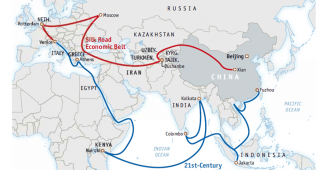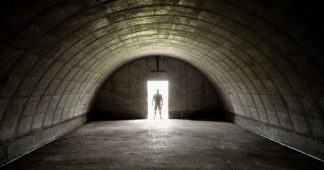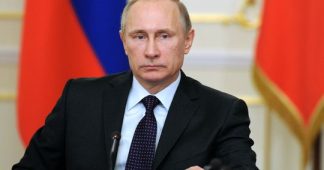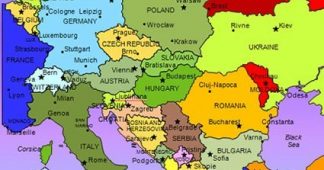Who Are We and What Do We Want?
By Iurie Rosca
In order to understand Moldova and its problems, the Western media consumer has to accept that what is good for Western countries is not necessarily perfect for others, who have different historical, religious, civilizational and cultural backgrounds. I start with this because at first glance acceptance of differences would be very essence of the Western model, but our experience of the post-Soviet reveals that in reality things are different. After the USSR was dismantled, the Western craftsmen of the transition from the gloomy communist past to the bright liberal future ignored any difference and imposed a universal recipe for all ex-communist countries. the well-known concept of ”the West and the Rest” impregnated by classical eurocentrism was seen by the winners from Euro-Atlantic centers of power as an obligatory way of acting. And since every nation in the world is left with only one way of development, the ex-communist countries have been invited to make a civilizational leap and to adapt its own societies to the standard model. It means to repeat the path traversed by the West through Modernity: mass democracy, market economy and human rights, plus secularism, open borders, and alignment with the only civilization on the upper stage – the West.
Some twenty-five years ago nobody in both areas, East and West, had any other approach on this new geopolitical and historical realities. The East must be westernized, otherwise it cannot overcome its communist past, achieve prosperity and become a normal, developed society. The collapse of the communist system has led to the creation of an intellectual vacuum in the respective societies. And this vacuum was immediately filled with the liberal paradigm, which seemed perfect, indisputable and axiomatic.
The tragicomic situation that arose after the fall of the USSR can be characterized as such. After 50 years of the Cold War between East and West, the West defeated the East who capitulated. And for the first time in history, the defeated side received the conditions of capitulation in a state of happiness, and accepted as a gift the plan of geopolitical and economic colonization.
Thus, Moldova also bought an ”one way ticket” for the train that led us to prosperity. Year after year we executed all the “precious indications” from Western power centers, such as the IMF, the World Bank, the State Department, the EU etc. We copied the institutions, the legislation, the economic model, etc. We have achieved total liberalization of prices, we have made mass privatization, we have opened the internal market for Western capitals, goods and services, we have equaled the foreign entrepreneur with the local one. We did everything in order to respond to all criterias suggested (or imposed) from abroad. But the promised state of general happiness still did not come.
Thus, our economic degradation is not generated primarily by local incompetence, or misunderstanding on how to successfully lead the transition to the ”perfect model”, because the model imposed on us was from the beginning unable to produce positive results. This economic model is not oriented to produce prosperity for the large social stratum, but is built on the vicious principle of how to make more and more money for the ”smart guys” who are ruling the economic game. The principle ”small government” doesn’t mean good for business but more tools for the ”big business” to subordinate the states to its egoistic interests and thirst for luxury to the detriment of the absolute majority of people. So, the supremacy of the Western model did not mean to us anything else than economic colonialism, which was easy to implement due to the intellectual colonialism which preceded the economic one.
In other words, after the Soviet period, it was not Moldova that deviated from the ”only right and perfect path of development”, but rather the Western economy deviated from its traditional free market model based on national borders, civic responsibility and ethical values by plunging into an unprecedented global scale economic model.
The extension of speculative, financial, usurious capitalism at a planetary scale destroyed the classical model of productive capitalism. In these conditions the dream to develop a local economy model, based on the proximity principle, on transparency and the moral responsibility of the market players has become unrealistic. Transnational corporations are guided by other priorities, away from the interests of communities where they operate from large distances. It is well known that the closer the owner is to the place of his economic activity, the more rooted he is in the local community the better is his activity on the ground, the problems of this community being his own problems directly affecting his life and his family. But the development of such a type of economy in current conditions is more than difficult.
Moldova is not a productive, but a consumer economy. How does it work? Very simply. Moldovans work abroad, on the external labor markets to earn money which is spent in Moldova to buy goods produced abroad which have completely invaded our internal market. How can a local businessman compete with, say, a German or Turkish one? Difference in production capacities, know-how, access to cheap credits, etc. dooms the local entrepreneur into a loser right from the start. Moldova has signed the ”free trade agreement” with the EU and with Turkey too – a well done operation in favor of our big brothers. It is worse for us, the aboriginal population whom these glass beads and illusions are sold to in exchange to natural resources and the key sectors of the national economy.
Personally, I was four times a member of Parliament, twice Vice-President of the Parliament, Deputy Prime Minister, and I have accumulated a rich international experience. But I confess that I spent two decades of political activity and assiduous reading in four languages (including English and French) until I realized why things in my country are going from worse to worse. When I realized that the West had actually applied to the ex-communist space the same treatment that the Third World has long suffered, everything became extremely clear. When principle of ”kicking away the ladder” (Friedrich List) or ”comparative advantages” of “freetradism” (“laissez-fairisme”) has been fully applied, then Moldova’s chance of emerging from the crisis strictly following the imposed rules from the outside becomes illusory. By blindly following ”friedmanism” and the advices from the Chicago Boys, by assuming quasi-religious principles of the so-called ”Washington Consensus” Moldova became a classical poor country as so many other countries around the world which were guided to go in the same direction. For more argumentation on the transitioning experience of post-communist countries, reading the books of Joseph E. Stiglitz or Ha-Joon Chang would be sufficient. ”The shock doctrine” (Naomi Klein) didn’t avoid our country. It ruined our economy, provoked ”mass nomadism” (Paul E. Gottfried) of our people, determined a ”demographic winter”, and pushes our nation to an unprecedented disaster.
The major causes of Moldova’s disaster are other than pretending the dominant neoliberal discourse. The first is the excessive obedience of the ruling class to external power centers. The “development partners” that lend to the Republic of Moldova an enormous amount of money does not represent charity foundations, but tools of global plutocracy, which seeks to achieve astronomical gains. External financing in exchange for free trade, adjustment of domestic legislation to the detriment of local business and in the interest of global corporatocracy, the tailoring of monetary, customs, fiscal, budgetary and social policies have substantially reduced the state’s ability to promote independent economic policies. The truth is that it is precisely the forced dressing of the Republic of Moldova in that suffocating “golden straight jacket” (Thomas Friedman) that strangles any chance of economic recovery in the country. Moldova, like so many other countries, subjected to “structural reforms” and neo-liberal adjustments predicated on “market fundamentalism”, has yielded for a long time its sovereign right to manage its own economy. Under these circumstances, the succession to governing of various parties and coalitions, whether they are totally corrupt or relatively decent, cannot lead to radical positive changes; all differences they may induce fall within a minimum margin of error left by the authors of economic and financial policies from the outside.
So, in order to develop our country, the ruling class needs to make a paradigm shift and to assume deeper understanding of the primary causes of our problems. Because without establishing a proper diagnosis it is impossible to treat a sickness. We, Moldovans, cannot change the planetary situation, but we must adapt our policies to this reality. How? By wisely adapting our institutional, legislative, financial and economic capacities to the international context and promoting our own national interests in partnership with states and non-state entities that understand our problems and have the will to cooperate with us in the bilateral interest. Easier said than done. But nothing substantial in the history has been done without a major strategic vision, without setting higher goals beyond common thinking.
Neutrality as a key element of foreign policy
One of the main targets of Moldova must be to promote and to affirm at the international level its vocation as a neutral country. It means not only to avoid the involvement in the major geopolitical conflicts of big international actors such as Russia and the USA. Moldova could and should initiate or reinitiate the movement of non-aligned countries in the new geopolitical context by inviting different countries which are sharing the same approach to participate in this process. We have to return to the experience of the Bandung Conference (April 18–24, 1955, Indonesia), to develop and adapt these principles to new historical conditions in order to be strong enough in the dialogue with great powers. Without this kind of international solidarity, without our original and wise contribution to a new international architecture, countries like Moldova have very thin chances of becoming relevant and respected international actors. This idea was suggested to me by French thinker Hervé Juvin in our personal discussions and through his books and articles.
Moldova has not to aspire to become a member of NATO or Russia-centered military and security group of states, but an independent, neutral, and correct international player. This idea can become part of our national strategy or, if you like, part of our dream. Because a nation which does not have its own major dream is condemned to be just a consumer of foreign ideas and concepts, and, last but not least, the object of foreign interests which do not necessarily coincide with our own.
The prominent Romanian economic analyst Ilie Şerbănescu, speaking about the case of his country, characterizes these new geopolitical and economic realities by the very title of his book: “Romania, a colony on the periphery of Europe“. Unfortunately, Moldova’s status today is not different. Some years ago I published a book which describes our new post-Soviet realities and put the following title: ”The downfall from the USSR to the EU”. This is the glorious path of our nation during the last 25 years.
Yes, Moldova today is a ”captured state”. (But in the USA we are seeing the same story. The ”deep state” is playing the same game against Trump as are our local oligarchs against the President and against our national interests.). It is subjugated by local kleptocrats and oligarchs. This is a very sad reality. But in this case we have to keep in mind at list some factors which determined this situation. First of all, excessive capital accumulation as an expression of human greed does not represent a local specificity for Moldova, but is characteristic of all “capitalist” countries. Secondly, the emergence of the “homo oeconomicus” on the stage of history has led to the subordination of politics to economics, the center of power passing to the capital owners. So, in the case of Moldova, ”nothing personal, just business”. If today Moldova has a puppet-government (in it is totally true!) this situation is possible for two evident reasons. The first one is that because the local oligarchy who manipulates puppets installed in government is in turn manipulated by the global oligarchy that manipulates their own puppets such as euro-commissioners, the servants from the IMF, WB and so on. The second one is the following: local plutocrats are tolerated and supported by global plutocrats, because Moldovan vassals accept to be used in the total war against Russia. A frequent example for recent years is the non-admission of Russian journalists to Moldova and their deportation directly from Chisinau airport to Moscow. This damages the economic and political interests of the country, and instead serves the interests of global strategists to maintain tensions around Russia’s borders by using “new democracies” as geopolitical war tools.
”The Russians are coming!”
And now just a few words concerning ”the Russian factor” in the region and the russophobia methodically cultivated by global elites not only now, but during last several centuries. It would be foolish to deny the reminiscences of the imperial vision in the current policy of Russia which used to be stronger than it is today. Obviously, these reminiscences affect national interests of post-soviet countries, but infinitely less than the globalist elite or, to quote David C. Korten, than the corporations which rule the world. So, in this new historical and geopolitical conditions Russia is seen as a ”target country” as well as Moldova and the whole region, and even all countries which are going through unprecedented processes of desovereignisation. Namely new extraterritorial actors which during the last decades have become the main planetary players are representing a common threat for Russia, Moldova and even America. Take a look at current political realities in USA. Who is trying to obstruct and dismiss Trump? The same global elite which cannot tolerate a president who just declared his intention to change the internal and external agenda of the biggest ”captured state” in the world (USA) in favor of the American people and symmetrically in detriment of global plutocracy.
One of the most popular myth in the West is the Russian threat to global peace, democracy and so on. But the real problem is not the aggressive character of current Russian rulers or the lack of democracy in this country but enormous Russian natural resources and territory which are coveted by the global elite. Anti-Putin propaganda is not because he is not a ”good guy”, but because he is not cooperative enough to sacrify the national interests of Russia on the altar of plutocracy interests. In this regard, compared with Moldova, Russia is partially a sovereign country first of all thanks to its military potential.
Yes, Moldova is aspiring to obtain the withdrawal of Russian military troops from Transnistria. Their presence affects our territorial integrity and creates a lot of economic, social and administrative problems. But if we are responsible people, i.e. able to give an adequate response to this difficult situation, we have to see the whole picture of the region. By this I mean the global and implicitly the regional balance of forces. Let us to be honest – who extended its military presence after the collapse of the USSR, Russia or NATO? Several years ago I asked one Russian diplomat, former ambassador in our country whose name is not appropriate mentioning here (being a private discussion), ”When will Russia be able to withdraw its military presence from Moldova”? The answer was quick, direct and sincere. “Mr. Roșca, look at the map. Americans are in Romania. So, we are constrained by the strategic circumstances to remain in Moldova”.
In this situation Moldova has to think deeply on how to turn a geopolitical disadvantage into an advantage. Surely not through aggressive anti-Russian rhetoric, nor by assuming the role suggested by Americans to become a NATO ally against Russia. The Republic of Moldova is a neutral country. It ought not to admit the role of the ally of the Russians against the Americans, nor the ally of the Americans against the Russians. Moldova must overcome its dishonorable role as an object of international relations and become an independent, fair and predictable subject of international affairs. It’s not an easy task. But if the Moldovan political leaders will not have the clairvoyance, the courage and the diplomatic tact to follow this path, the posture of our country as the vassal of the great powers or the exchange currency between them is inevitable. Look at the recent Georgian and Ukrainian examples. What happened when the rulers of these countries blindly followed the advices from overseas friends? Who will now restore the territorial unity of these two countries? The United States? Excuse me, but the Americans have achieved their goal: definitively hostilizing the relations between these two countries and Russia, and at the same time determining them to feel permanently need of USA protection against the “Russian threat.”
As for the myth of Putin’s obsession to control Moldova, if we are serious, we can see that after so many years of being in position number one, he cannot even totally control his own country. This is especially evident when we are trying to get into the situation in Russia’s financial and economic institutions. In this sense it is enough to follow the statements and articles of the most notorious authors on economic issues such as Valentin Katasonov, Sergey Glazyev, Mikhail Hazin, Mikhail Delyagin etc. Look into the internal situation in Russia by abandoning the cliché of mainstream media russophobic propaganda, without prejudices and naivety. The old team of Russian ultraliberals which was promoted in Yeltsin times is still very powerful and even Putin cannot neutralize it. To invoke just several names, may I remind you Anatoly Chubais, the key promoter of the ”shock therapy”, Alexei Kudrin, former minister of Finance always ready to come back to key positions of government, Anton Siluanov, current minister of Finance and, of course, the legendary ”iron lady” among Russian high dignitaries, the eternal head of Central Bank of Russia Elvira Nabiullina. They and many others from the same team of ”global Russians” or neoliberal apostles are representing what is called now in the US the ”deep state”. They are linked to the same center of power who is now obstructing Trump. They have their agenda and priorities which are radically different from the national interests of Russia. Thus, to conclude, we have to keep in mind that even the power of Putin who is portrayed as a dictator is very limited, very far from the image so popular in the West as a Stalin-style statesman.
So, while remaining realistic, it is not necessary to exaggerate the “Russian threat”. On the contrary, in the face of the new ideological totalitarianism, promoted by radical hyperliberalism, including the imposition of “political correctness” as a new form of censorship, the LGBT agenda, transhumanism, the consumerism cult, and mass pseudoculture, more and more people in the world see Russia as a bastion of authentic, traditional, Christian, family values. The famous American conservative thinker Patrick J. Buchanan exclaims in the title of his article which was written several years ago: ”Vladimir Putin, Christian Crusader?”:
”In the culture war for the future of mankind, Putin is planting Russia’s flag firmly on the side of traditional Christianity. His recent speeches carry echoes of John Paul II whose Evangelium Vitae in 1995 excoriated the West for its embrace of a “culture of death.”
What did Pope John Paul mean by moral crimes? The West’s capitulation to a sexual revolution of easy divorce, rampant promiscuity, pornography, homosexuality, feminism, abortion, same-sex marriage, euthanasia, assisted suicide – the displacement of Christian values by Hollywood values”.
So, if in the previous historical period the USSR incarnated the militant atheism, “the empire of evil”, and America represented the bastion of Christianity and the defender of moral values, it seems that after the fall of communism, the roles have reversed. And this huge historical changement seems to be ignored by so many Westerners who remain inside of the old paradigm, valid during the period of Cold War.
In a TV show I hosted with the famous Romanian painter and writer Sorin Dumitrescu, a full member of Academy of Science. I asked him how he sees the new situation that was created during the 25 years of post-communist transition. His response was direct and harsh: “We are currently under the most terrible form of occupation ever known in history, the axiological occupation“. He specified that the substitution of traditional values by mass-culture, consumerism and hedonism affects our cultural codes more profoundly than it was under communist regime. Or, to quote another friend, the French essayist, writer and economist Hervé Juvin, he calls this new reality in the title of his last book ”the government of desire”. I am talking about the consumer society, the domination of artificial needs imposed by advertising which distorts our traditional identity, our way of thinking and makes us abandon our religious and our cultural roots. Another French author, Michel Clouscard, calls this new type of society we are now living ”the capitalism of seduction”. Why am I talking about it here? Because the first problem of our society is not the poverty or the corruption at the high level of state administration – both of them exist in abundance – but the brainwashing of the masses with neoliberal poison. This phenomenon represents a very dangerous and dissolving factor, which destroys the traditional cult of labor by inducing a certain type of volitional paralysis and civic absenteeism.
How to be successful in Moldovan politics
And now just a few words about our political system, successful parties, electoral campaigns and finally about state power. The situation in Moldova in this sense is not different from Western ”old” democracies. The only value which makes you relevant as a political leader or party is money, the amount of money, preferably dirty money. In our case, the financial flow for politics is coming frequently from abroad. So, the first condition – money. And only from big bags of money are deriving political and media projects, which are working together to gain power for shadow or declared financiers. And as we know, he who pays the piper calls the tune. So, welcome to the post-modern, virtual, caricatural, mass democracy! What kind of will of the voters or what kind of sovereign right of the people to decide their destiny can we talk about when everything has become a simple exercise of manipulation, political marketing, and showbiz? The appearances of a democratic process have been preserved. And things will remain exactly the same until a major crisis, the only one that could involve the undertaking of major risks, can offer the opportunity for true leaders to emerge. But for the moment, under the “reign of quantity” (René Guénon) the merchant takes the place of the hero and the private interests kills the vocation of statesman.
Who Are We, Moldovans?
My country is divided not only by conflictual interests of Russia on the one side and the Americanocentric West on the other side. We are also divided in two belligerent camps, which include political parties, civic activists, journalists, intellectuals etc. I’m talking about the so-called identity conflict. The sacramental interrogation of Samuel P. Huntington ”Who Are We?” is available and critical for Moldovan society more than for others. Are we Moldovans or Romanians, or maybe Russians? Why in our society if someone sympathizes with Romania, he symmetrically hates Russia and vice versa, if someone love Russia, he obligatory detests Romania? This phenomenon has its deep historical roots, each participant of interminable and mostly sterile debate has its own truth, sophisticated argumentation and irreconcilable approach. Our country, the land called once Bessarabia, used to be part of medieval Moldova, after it – part of Russian Empire, part of Romania, and finally part of the USSR. So, can we change our so controversial and difficult past? Of course, not. But what we really can and must do is to totally, profoundly and maturely assume our history and to build a better future for our people.
During last years I have written a lot of articles and several books, both in Romanian and in Russian, taking the effort to contribute to defining the collective profile of our society. One of the theses I expressed in the following way: ”Moldova – a part which became a whole”. Or, if it has not yet become, it is in the process of becoming. The conceptualization of a national idea as an unifying factor is a core mission of our national elite. We are a bilingual society, Romanian and Russian is very present here. It is true, some of us consider that the ”golden period” is the interwar Romanian past, others have the same feeling for the Soviet period. Our cultural and historical symbols are divided by following the same line of fault.
But, despite these differences the love for our common motherland, Christian wisdom, the pride of being born here, our dead buried in the same land, the air we breathe together, the water we drink, and especially the deep sense of belonging to the same family must help us in conceptualizing our own identity profile. Not against Russia, not against Romania, but for our sake.
If during such a long period the rivalry between Russia and Romania concerning the ”Bessarabian question” was founded on the thesis-antithesis principle, now we have to move forward towards another approach. Moldova has to overcome its status of a zone of geopolitical disputes between Russia and Romania and become a zone of confluences and cooperation between these two countries. All three nations have one common religious faith – Orthodoxy, the byzantine cultural matrix, common history as allies against the Ottoman Empire, common saints and tragic communist past.
We are at the intersection of two cultures, Romanian and Russian, we are the synthesis of these two worlds. And this reality must generate within the Moldovan society, as well as among our friends in Russia and Romania, inclusive, not exclusive approaches. Having the advantage of knowing two languages and two cultures, we must learn that what used to be a reason for conflict in the past, must now become a factor of consensus. Moldova has the historical mission to make full use of its double vocation – the golden bridge between East and West, but also equally between Russia and Romania.
But in order to achieve these major goals, Moldova needs an intellectual revolution or, in other words, an intellectual decolonization that allows abandoning old stereotypes and naive approaches. Who can help speed up this process? Obviously, the peaks of the national elite, the people who have the vocation of spiritual leaders. Those who assume the collective destiny of the nation as a personal stake, as a mission of their lives. I know we have such a person, and also we have friends who are solidary with Moldova in the East and in the West, who want and can help us. We need their help. But to spend their time and efforts to the cause of Moldova they need to feel our dedication that could inspire and motivate them.
This trend overview increasingly acquires more force and visibility in our society. Step by step, our academic and publishing activities, as well as the adopted attitudes in the alternative mass media towards the neoliberal dominant ideology, are perceived and accepted by more people. Our public discourse complies perfectly with both the approaches of the new anti-System dissidents from the West and the Russian Conservatives. This new movement still has to manifest its major project of geopolitical reconfiguration of our continent. Therefore, what can be more valuable for this new historic context than the active participation of Moldova in this ongoing process, a participation that claims a broad vision upon the century we stepped in?
* Iurie Rosca is the founder of the People’s University of Moldova. He was one of the founders of the first clandestine newspaper in Moldova during the soviet period (1988), he was one of the founders and vice chairman of the Popular Front which struggled against the Soviet regime and for independence of Moldova, He has served as deputy Chairman of the Parliament and Deputy Prime Minister of Moldova











